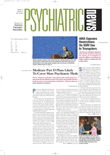The AMA will advocate for dropping a section of the U.S. Patriot Act that allows the government to seize patients' medical records while also prohibiting physicians from informing patients about the seizure.
If those sections are renewed by Congress, they should be amended substantially to better protect medical privacy and patient confidentiality, according to an AMA Board of Trustees report approved by the AMA House of Delegates at its annual policymaking meeting last month in Chicago.
The report was written in response to a resolution brought to the house last year by APA and the American Academy of Child and Adolescent Psychiatry (AACAP).
Section 215 of the Patriot Act provides that the FBI may require production of “tangible things” (including books, records, papers, documents, and other items) for an investigation to protect against international terrorism or clandestine intelligence activities. The act further states that“ [n]o person shall disclose to any other person... that the FBI has sought or obtained tangible things under this section.”
At the AMA's interim meeting last December, then APA President-elect Steven Sharfstein, M.D., told delegates that the Patriot Act is unique from other laws requiring disclosure of patient records because of what amounts to a gag order—a provision forbidding the physician from informing the patient or anyone else that records have been taken.
“It would mean the treatment relationship would have to end,” Sharfstein said.
The section is scheduled to “sunset” at the end of 2005. The AMA board report suggests that if the section is not dropped altogether, it should be amended in any of the following possible ways:
•
The term “tangible things” should be narrowed.
•
Only specific, discrete, and relevant portions of patient medical records should be disclosable.
•
Patients subject to disclosures should have to be shown to be the focus or target of a terrorist or clandestine intelligence investigation.
•
Orders should be issued only with the knowledge of the patient to whom the ordered disclosure pertains.
•
The gag provision should be limited to only the most extraordinary circumstances, and the attorney general should be required to disclose publicly order requests and grants on a periodic basis, among other safeguards mentioned above.
Despite some testimony during reference committee hearings that counseled caution when treading on matters related to national security, the House of Delegates passed the report without debate. It was one of a number of items of importance to psychiatry that were readily approved—a sign, APA leaders say, of the continuing and growing influence within the house of medicine of the psychiatry delegation. (See related stories elsewhere in this issue: AMA actions regarding SSRIs in children and adolescents on
page 1; and on suicide and depression on college campuses and pay for performance on facing page.)
John McIntyre, M.D., chair of the Section Council on Psychiatry and head of APA's delegation, said the action taken by the house on the Patriot Act is evidence of the AMA's staunch defense of medical privacy.
“This was really an issue affecting the doctor-patient relationship, and it demonstrates the willingness of the AMA to stand in defense of that relationship even in the face of controversy,” he said.
The board report states, “Even without hard data, it can be assumed the act will cause some patients to avoid seeking care or to be less than forthcoming in the physician's office. Quality of care may suffer. Unable to protest or even publicly acknowledge a disclosure, medical professionals stand to lose the trust and confidence of their patients and undermine the patient-physician relationship.”
Other Actions
These are other items of interest to psychiatry on which the House of Delegates acted:
•
Enhancing access to FDA data: Also written in response to an APA/AACAP resolution and approved by the house was a report by the Council on Scientific Affairs titled “Enhanced Physician Access to Food and Drug Administration Data.”
That report calls on AMA to (1) urge the Food and Drug Administration (FDA) to issue a final rule, as soon as possible, implementing modifications to the format and content of the prescription drug package insert with the goal of making the information more useful and user-friendly to physicians; (2) urge the FDA to collaborate with physician organizations to develop better risk communication vehicles and approaches; (3) urge the FDA to apply new tools to gather data after drugs are approved for marketing, including a broader use of targeted postapproval studies, institution of active and sentinel-event surveillance, and data mining of available drug-utilization databases; (4) monitor the design and implementation of any independent drug-safety board that may be instituted within the FDA, or external to the agency, and respond as appropriate; and (5) support adequate funding to implement an improved FDA postmarketing prescription drug surveillance process.
•
Direct-to-consumer advertising (DTCA): A number of resolutions on drug marketing to consumers, including one submitted by APA and AACAP, were debated during the meeting. Some of those resolutions called for an outright ban on direct-to-consumer advertising.
The APA/AACAP resolution asks for an AMA report on the subject that would explore strategies for minimizing the potential harmful effects of DTCA. Among these possible strategies is a “quiet period” immediately following drug approval during which advertising would not be permitted, allowing time to monitor patient safety and efficacy.
During reference committee hearings, David Fassler, M.D., the AACAP delegate and a member of the Section Council on Psychiatry, noted that at least one drug company had already voluntarily agreed to such a policy.
All of the resolutions on DTCA were referred to the AMA Board of Trustees with the likelihood that they would be considered together in a report by the Council on Scientific Affairs, as requested by the APA/AACAP resolution.
•
Educating physicians about Medicare Part D: Rounding out the list of psychiatry-sponsored actions approved by the AMA last month was a resolution requesting the AMA to prepare a report on educational programs for physicians around issues related to the new Medicare Part D prescription-drug benefit. That resolution also asks the AMA to “make available appropriate educational materials targeted for physicians on Medicare Part D issues, so that they may best assist patients and effectively meet their responsibilities under Medicare Part D laws and regulations.”
•
Benzodiazepine restrictions under Medicare: The resolution asks the AMA to “work to end the exclusion of medications of the benzodiazepine class from reimbursement” under the new Part D benefit.
•
Depression and physician licensure: This resolution asks the AMA to“ recommend that physicians who have major depression and seek treatment not have their medical licenses and credentials routinely called into question but instead have decisions about their licensure, credentialing, and recredentialing be based on professional performance.”
It further calls on the AMA to make the resolution known to state medical licensing boards and to hospitals and health plans involved in physician credentialing and recredentialing.
More information about these and other actions taken at the AMA's 2005 annual meeting are posted online at<www.ama-assn.org/ama/pub/category/14887.html>.“ Enhanced Physician Access to Food and Drug Administration Data” is posted online at<www.ama-assn.org/meetings/public/annual05/csa6a05.doc>.▪

